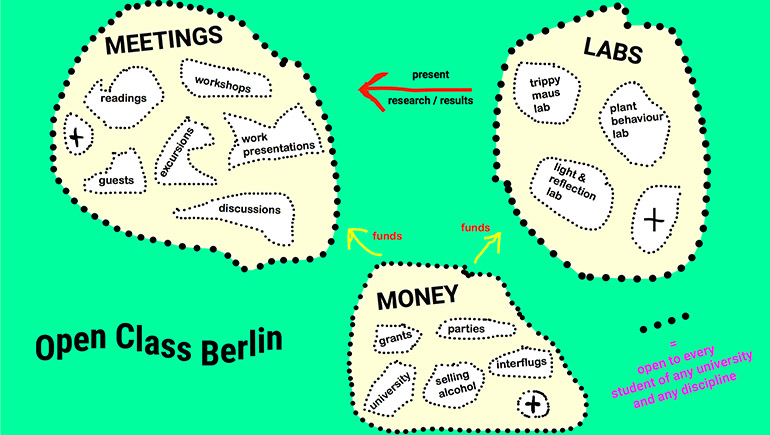Open Class is a self-organised education and research experiment currently based at the faculty of Fine Arts at Berlin University of Arts. It’s a platform for collective learning, open to any student from any university and any background, connecting disciplines, which are usually separated in the educational system.
Open Class consists of two structures: Open Labs and Open Meetings.
Open Labs are research groups of students from different disciplines who meet on a regular basis to approach a certain topic with their respective methods. The result of their research is presented at the end of every semester to the public.
In Open Meetings people from all labs come together. Here, new labs are introduced, research-in-progress from the running labs is presented, meta-topics like interdisciplinarity and self-organisation are debated and organisational issues are discussed.
Openness is one of the key pillars of Open Class. Anyone can join, anyone can create a lab and anyone can decide on class matters. Every class and lab meeting is open to drop-ins. There are neither rules nor guidelines how to run a lab in order to be open to new ideas.
Another pillar is the holistic approach to education. In big cities, students go to the university to learn, but leave this context to live and love. We want to enable the students to do learning, living and loving in one place. Interesting collaborations don’t emerge in seminar rooms, but when people hang out and drink a beer with each other. Therefore, community building through dinners and excursions is one important part of our work.
The last pillar is self-education. In an interdisciplinary context the concept of one teacher is not working anymore. In Open Class everyone is teacher and student at the same time. Knowledge is shared horizontally and not vertically. Research is done hand in hand.
Normally in universities, research is done by PhD students, PhDs, postdocs and professors. Research questions are thereby filtered by the academic job market, funding agencies and interests of companies. The academic job market and funding agencies are conservative. Change takes a lot of time. Radical ideas don’t get funded. We want to challenge this status quo, by enabling Bachelor and Master students to research on the topics they are interested in, using the facilities of the different universities of Berlin. We expect research ideas that challenge the consensus of the scientific community and proof fertile for further inquiry.
In the first semester we had four labs running: one on plant behaviour, one on light and reflection, one on writing about art and one where students shared their prosa and poems with each other. In the coming semester at least five new labs will start: slow motion lab, biological sci-fi lab, communi lab, drag lab and #storyyourvision lab.
If you are interested in participating please write us or just come to our next Open Meeting which will be announced on our website and on our facebook page.
- Filipe-Guilherme Pirl

